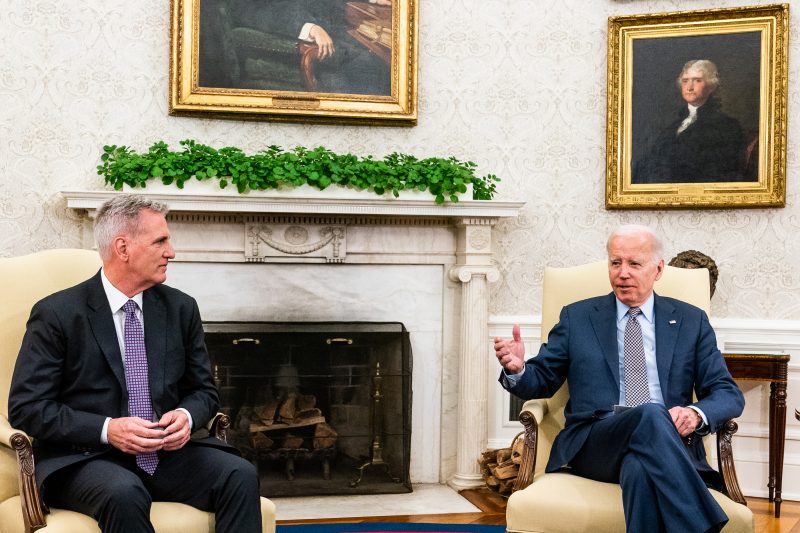When Congress declined to forgive student debt, President Biden announced he would do it on his own. When lawmakers balked at extending an eviction moratorium, his administration did so unilaterally. Facing congressional paralysis on immigration, Biden issued a string of executive orders on the issue.
Now, as time grows short for a debt limit deal and progressives call on Biden to sidestep Congress and resolve the standoff via executive action, the longstanding tension in his presidency between traditionalism and presidential power is at a new level. His willingness to push the limits of presidential authority at strategic moments in the past is emboldening liberals to demand that he invoke the Constitution to disregard the debt ceiling.
“The president could say he’s following his constitutional obligation to make the payments that Congress has instructed him to make,” said Rep. Ro Khanna (D-Calif.), one of dozens of Democratic lawmakers who signed a letter urging Biden to resolve the crisis on his own. “Then let the Republicans take it to court.”
Khanna and other liberal lawmakers, worried that the coalescing debt limit deal with Republicans will require severe spending cuts, have rallied around an untested interpretation of the Constitution’s 14th Amendment, which includes the clause, “the validity of the public debt, authorized by law … shall not be questioned.” Others point to the constitutional requirement that the president ensure that all laws be “faithfully executed.”
Under these theories, the Treasury Department could keep borrowing money beyond the limit set by Congress, issuing debt to pay for spending that Congress has, after all, already authorized. While such a move has never been taken, White House lawyers have been investigating whether the idea has merit.
What happens if the U.S doesn’t raise the debt ceiling?
End of carousel
For now, Biden and House Speaker Kevin McCarthy (R-Calif.) appear to be moving closer to a deal that would allow the debt ceiling to be raised, but an agreement is far from certain. If it is not reached, the government could default as early as June 5 with potentially catastrophic consequences for the economy, leaving unilateral action by Biden as one of the few remaining options.
Behind the scenes, Biden has been getting regular briefings from his negotiating team and calling stakeholders as the talks have advanced, White House officials said. He has also been conferring privately with Vice President Kamala Harris, whose public role in the standoff has been relatively limited.
But he has not been involved in the minutiae of the negotiations, which are being held–sometimes virtually–almost around the clock, aides said. “The president is giving negotiators the space and the time to negotiate,” White House spokeswoman Karine Jean-Pierre said recently. Instead, he steps in at what he sees are pivotal moments, for example calling McCarthy from Air Force One on Sunday as he traveled back from Japan.
Aides say Biden urgently wants a deal, but he has cut back his public comments as negotiators have closed in, seemingly wary of upending the talks. Some Democratic lawmakers, complaining that they have been left in the dark about the state of the negotiations, have called on Biden to make a more forceful public case as well as improving internal communication.
Biden left the White House for Camp David on Friday, a move that worried some Democrats give the impending deadline. White House officials say the president will continue to be engaged on the issue even as he travels this weekend, with Jean-Pierre saying, “the president could deal with this issue anywhere he is.”
As for the 14th Amendment, the president has been publicly torn, saying he believed it empowered him to circumvent the debt limit but also questioning its usefulness in the immediate crisis, since invoking it would likely prompt a lengthy court fight. “We have not come up with a unilateral action that could succeed in a matter of two weeks or three weeks,” Biden said recently, adding that the only resolution to the impasse is old-fashioned dealmaking between Democrats and Republicans. “So it’s up to lawmakers.”
Last October, when some Democrats urged abolishing the debt limit altogether before Republicans took control of the House, Biden rejected the idea as reckless. “You mean, just say we don’t have a debt limit?” Biden said. “No. That would be irresponsible.”
These comments reflect an internal struggle Biden has faced over the past two years, as he has sought to balance his impulse to govern as a bipartisan statesman — one who respects long-standing ways of doing things — with his desire to carve out a consequential presidency that advances progressive causes with historic efficacy.
Those competing instincts have shaped Biden’s approach to a range of issues, including abortion, immigration, climate, gun safety, student loans, policing and voting rights. In many of those cases, Biden initially expressed reluctance about acting unilaterally, given his pledge to restore norms after the chaotic Trump presidency, only to later embrace executive measures when bipartisan compromise proved elusive.
In doing so, he has won plaudits from Democratic loyalists who saw a narrow window for action and argued that Republicans have not hesitated to wield presidential power. But just as often, Biden’s plans have been stymied by the courts or failed to pacify activists who believe he should be doing more.
The debate has taken on new resonance as Republican presidential candidates, including Florida Gov. Ron DeSantis, seek to portray Biden as a weak executive and pledge to aggressively use their constitutional powers if elected.
When it comes to the debt limit, Biden’s aides for now say it is unproductive for Democrats to muse about an executive off-ramp whose feasibility is uncertain. Biden himself has cited the risk of trying an unproven theory when the stakes for the economy are so high.
If Biden were to invoke the 14th Amendment to sidestep the debt ceiling and continue borrowing, White Houses aides warn that investors would question the validity of any bonds issued under this untested authority. That uncertainty could have much the same effect as an actual default, they say, sending the economy into a tailspin.
Biden’s dilemma is hardly unique, as presidents increasingly face pressure from their supporters to push the limits of their authority, said William Howell, a professor at the University of Chicago’s Harris School of Public Policy and the author of several books on presidential power.
“The history of the presidency when it comes to power is a history of aggrandizement,” Howell said. “Presidents, because they are expected to do everything and have a solution to every conceivable problem, can be counted on to not only protect but to nurture and expand their powers.”
For Biden, who served six terms in the Senate and campaigned for the presidency by pledging a renewed era of bipartisanship and traditional dealmaking in Congress, the march toward a more expansive executive branch has been halting.
He has cited his legislative accomplishments on everything from climate change to gun control as evidence that he can successfully advance his agenda through a sharply divided Congress. At the same time, he has pledged not to let “extremist MAGA Republicans” stop him from making progress on various fronts, repeatedly threatening vetoes and issuing executive orders.
Some White House aides are frustrated at progressives’ increasingly vocal calls for unilateral presidential action on the debt limit, saying it makes it harder to finalize a bipartisan deal if lawmakers believe Biden can solve the problem on his own.
But Biden himself has lent some credence to these demands, saying weeks ago that he was ruminating on the 14th Amendment theory and stating more recently that “I think we have the authority.” He added that even if it is impractical under the current circumstances, he would like to find a way to test the feasibility of invoking the 14th Amendment once the current standoff is resolved.
Biden may not have to wait that long. A federal judge in Boston ordered a hearing next week in a lawsuit brought by a union of federal workers who contend that the 14th Amendment authorizes Biden to bypass Congress and pay the nation’s bills.
For their part, Republicans sharply criticize talk of a presidential workaround as a distraction at a time when, they say, the two parties need to be immersed in negotiations.
Rep. Byron Donalds (R-Fla.) called the notion of relying on the 14th Amendment to circumvent Congress “lunacy,” since Article I of the Constitution gives Congress, not the president, the power to borrow money. “That would actually go around Congress’s Article I powers under the Constitution,” Donalds said. “And the last time I checked, the 14th Amendment does not supersede Article I.”
But Felicia Wong, president and CEO of the Roosevelt Institute, a liberal economic think tank, noted that Article II says the president “shall take care that the laws be faithfully executed.” That includes the laws already passed by Congress incurring financial obligations, she said: “It is the president’s constitutional responsibility to execute all of the laws.”
Sen. Sheldon Whitehouse (D-R.I.) downplayed fears that unilateral action by Biden would invite lengthy litigation, noting that the Supreme Court is traditionally wary of intervening in disputes between the other two branches of government.
“It makes me at least believe that the Supreme Court would stay out of this one,” Whitehouse said, suggesting that the justices would not want to add sparking a global recession to their growing list of controversies.
Understanding the debt ceiling
1/4
End of carousel
Sen. John Fetterman (D-Pa.) put it more bluntly during a news conference last week. “If an unelected Supreme Court justice will try to blow up our economy, that’s on them,” he said.
Still, Biden has a mixed track record with the judicial branch, which former president Donald Trump populated with scores of conservative judges while in office. Federal courts have on occasion admonished Biden for attempting to sidestep Congress, and White House aides note that the Supreme Court has not been particularly friendly to the Biden administration’s interpretation of executive authority.
Federal judges have struck down several Biden administration policies, including his eviction moratorium, coronavirus vaccine requirements for large employers, and several initiatives on immigration and climate.
A federal judge has also ruled unconstitutional Biden’s plan to forgive hundreds of millions of dollars in student loan debt without authorization from Congress. The Supreme Court justices, who are set to rule on the initiative in coming months, expressed skepticism about it at a recent hearing.
The president faced perhaps the biggest debate over the reach of his executive powers when the Supreme Court overturned Roe v. Wade last year. Some of the same lawmakers who have signed letters calling on Biden to invoke the 14th Amendment also wrote the White House last summer urging the president to defy the justices’ ruling or find federal workarounds to state abortion bans.
Pro-abortion rights lawmakers and activists suggested that Biden should declare a public health emergency on abortion, build clinics on federal lands or outright reject the Supreme Court’s authority on this issue.
While Biden has taken several executive actions aiming to protect abortion rights, he has stopped short of endorsing these more far-reaching proposals. White House officials express concern that Trump-appointed judges would block such measures, and perhaps go further to hamstring the presidency with expansive rulings outlining the limits of presidential power.
The same sentiment is at play as the White House seeks to lower expectations about what the president can do on his own to deal with the debt crisis.
“It is not going to fix the current problem that we have right now,” White House press secretary Karine Jean-Pierre said when asked about the 14th Amendment. “Congress needs to do its job.”
Leigh Ann Caldwell contributed to this report.



























